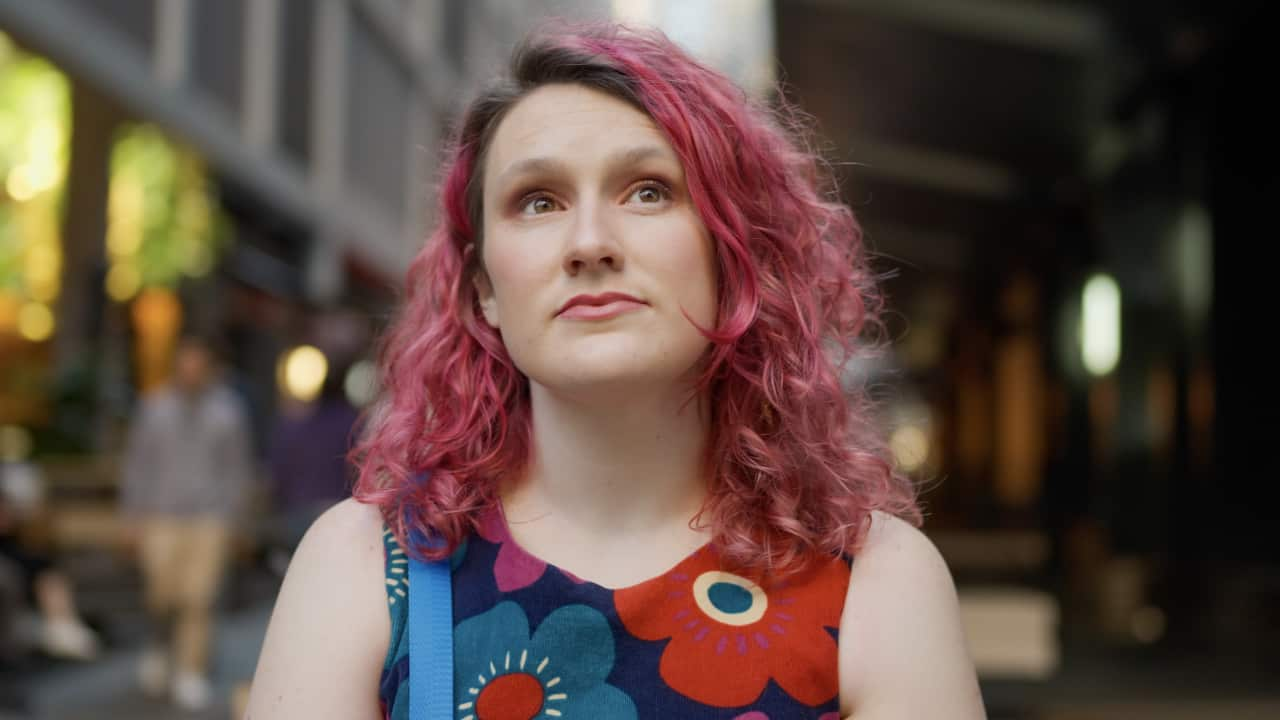This article contains references to sexual violence.
A parliamentary inquiry into Australia’s sexual consent laws is an opportunity to turn around the country’s “epidemic” of sexual violence, according to one senator involved.
The Senate inquiry committee of Liberal senator Paul Scarr, Greens senator Larissa Waters and Labor senator Nita Green heard from dozens of witnesses over three days this week - from women’s safety advocates and educators to legal experts.
Senator Waters told SBS News she was struck by the strength of victim-survivors, who also came forward to share their stories “in the hope of improving our system’s laws and the response to rape and sexual assault”.
“We have an epidemic of sexual violence in this country. The numbers of rapes and assaults are just horrific, and it’s clear that something is not working,” she said.
“This is an opportunity to turn things around.”
She said the inquiry heard “almost universal” support for a harmonisation of the country’s fragmented consent laws towards an affirmative model that has been adopted in some states.
“But it’s not just the law changing - we need education, we need training for everyone involved."
Calls for harmonisation of consent laws
A central focus of the inquiry was to look at inconsistencies in consent laws across the country and ask whether they can be better harmonised.
Sexual consent is understood as a free and voluntary agreement to participate in a specific sexual activity.The term 'affirmative consent' means someone is actively agreeing to or seeking another person’s agreement to that activity.
But the age of consent and relevant legal definitions differ across jurisdictions. NSW, Queensland, Victoria, Tasmania and the ACT have adopted some form of communicative or affirmative consent laws, which mean silence or a lack of resistance cannot be interpreted as consent.
“It has always been very bizarre to me that we have different laws in different jurisdictions around Australia,” Chanel Contos, founder of the Teach Us Consent campaign, told the inquiry on Tuesday.
Teach Us Consent teamed up with the National Women’s Safety Alliance to support a proposal to harmonise consent laws. Others agree, including Consent Labs - a not-for-profit delivering consent and respectful relationships education.
Consent Labs executive director Julie Cooper said sexual violence is a national issue that requires a national approach.
“Harmonisation creates an opportunity to implement best practice consent laws across Australia, whereby all young people receive equal protection under the law irrespective of the state or territory they are from,” she said.
But she said this must reflect modern community values, such as affirmative consent.
“We do not support any regression of the consent standards,” she told the inquiry.
Speaking later to SBS News, Waters agreed “we don’t want to see the states backslide”.
“If the federal government chose to bring the states and territories to the table and ask them to harmonise their laws, we’d be insisting they ask for a harmonisation up to best-practice standards.”
What is affirmative consent?
Dr Rachael Burgin, chief executive of Rape and Sexual Assault Research and Advocacy (RASARA) has researched affirmative consent for a decade. She said the term refers to “specific social theory” of consent and was not designed to be a legal principle.
“That translation of affirmative consent into legal practice is what we’re still grappling with,” she told the inquiry.
Saxon Mullins, a victim-survivor and director of advocacy at RASARA, said this gap means discussions about affirmative consent can leave people “confused and worried about what that means for them”.
“The main thing we want to talk with the public about is what affirmative consent looks like in real life - you’re engaging in sexual activity with somebody, you’re asking them continually, do they want to be here? Are they having a good time? And they’re continually giving you that response that they do, and that they are,” she said.
“When you break it down in that way, I think it seems as simple as it really is.”
The case against criminal law reforms
But some are concerned about the proposed changes, with one civil liberties group warning they may erode protections for the rights of the accused.
President of Liberty Victoria, Michael Stanton, said they could, in practice, disproportionately affect young people who may not understand the “technical provisions” of the law.
“When a person is engaging in sexual conduct, they are not considering the operation of very technical, very complex provisions in the Crimes Act,” Stanton told the inquiry on Wednesday.
The inquiry heard that one in five Australian women and one in 16 men over the age of 15 will or have experienced sexual violence in their lifetime.
Boys aged between 15 and 19 have the highest rates of offending of any age group.
Stanton also warned the practical impact of affirmative consent would require any accused person to give evidence, limiting their right to silence.
Burgin said there is no evidence that affirmative consent undermines the presumption of innocence nor reverses any right to silence.
“There is no evidence to support that it will result in increased wrongful convictions,” she said.
“Some criticism is that we’ll see more people ending up in court, held accountable for their behaviour, and we would welcome that.”
Katherine Berney, from the Women’s Safety Alliance, agreed.
“With a 1.7 per cent conviction rate nationally, we have a long way to go before that even needs to be on a radar of concern,” she said.
The Law Council of Australia supports a communicative consent model, which still requires positive consent from both people involved but does not have the extra element from the affirmative model which would require an accused person to show what they did to establish consent.
President Luke Murphy said there was limited evidence to suggest uniform consent definitions would mean higher reporting and conviction rates of sexual assault.
"We encourage the pursuit of other measures such as strengthening protections for complainants and victim-survivors," he said.
"These changes are more tangibly directed to the experience of giving evidence in the courtroom and may have a greater impact than sexual consent definitions.
"The criminal justice system is, on its own, a poor vehicle to achieve social change."
This argument was also rejected by some witnesses.
Legal reform is not the only answer
Many experts, advocates and victim-survivors agreed that legal reform is not a “silver bullet”.
Berney, from the National Women’s Safety Alliance, said that any law changes must be put in place to support broader change and not be used as a “standalone response”.
Contos agreed that reforms in isolation will not address the underlying causes of sexual violence, particularly those which are of a gendered nature.
“Current legal systems fall short in acts of sexual violence committed out of opportunity, entitlement, problematic attitudes and a misunderstanding of or disregard for consent,” she said.
Contos said harmonising laws would provide an opportunity for large-scale awareness, and help to avoid confusion when it comes to educating particularly young people about consent.
But she said education “can’t just be about laws”.
“When we’re delivering this education and giving consistent messaging around laws, we also need to give direct examples of violations of these laws that apply to normal-day scenarios that are relevant to these children,” she said.
Cooper agreed that consistent, holistic consent education is an important way to shift societal attitudes and lower rates of sexual violence.
“Change will only occur if it is implemented alongside other victim-survivor centred reforms to the criminal justice system, such as training that is trauma-informed for police, and modernising jury directions,” she said.
Holding systems and organisations to account
The inquiry heard that improving outcomes for sexual assault victim-survivors involves players in the criminal justice system, including police, judges and defence lawyers.
Burgin said systems and organisations had an obligation to prevent sexual violence in the community - and to change attitudes.
"We often talk about juries and the community and forget lawmakers, police, judicial officers, lawyers are part of that community," she said.
"We need to start holding these systems and organisations to account.
“Without attitudinal change, all of this will unfortunately just be dealing with people who have experienced rape, as opposed to changing lives and allowing people to live lives free from violence.”

Universities have responded to claims about sexual assault on campus Source: AAP / Mick Tsikas
Investigative journalist Jess Hill’s documentary Asking For It, which aired on SBS earlier this year, was used as video evidence in the inquiry for the first time.
She said recent , which was removed from the shelves of one major retailer, showed the country still has a long way to go.
“It’s a good reminder for this inquiry that this kind of puritanical response is still broadly held in the Australian public,” she said.
But Senator Waters remains optimistic.
“This is a big task and I’m hopeful this [inquiry] can be one small step towards improving safety for women and for everyone who experiences sexual assault," she said.
With additional reporting by Pablo Vinales, Finn McHugh and AAP.
If you or someone you know is impacted by sexual assault, call 1800RESPECT on 1800 737 732 or visit . In an emergency, call 000.












